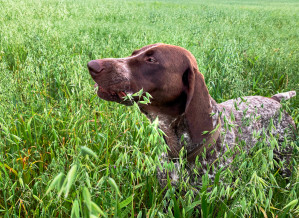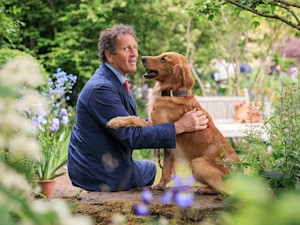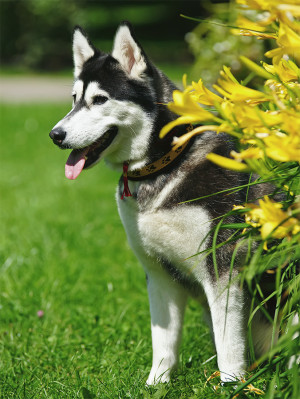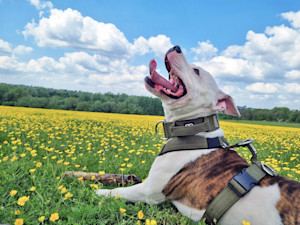Are Dandelions Poisonous to Dogs?
Are these yellow blooms friend or foe?
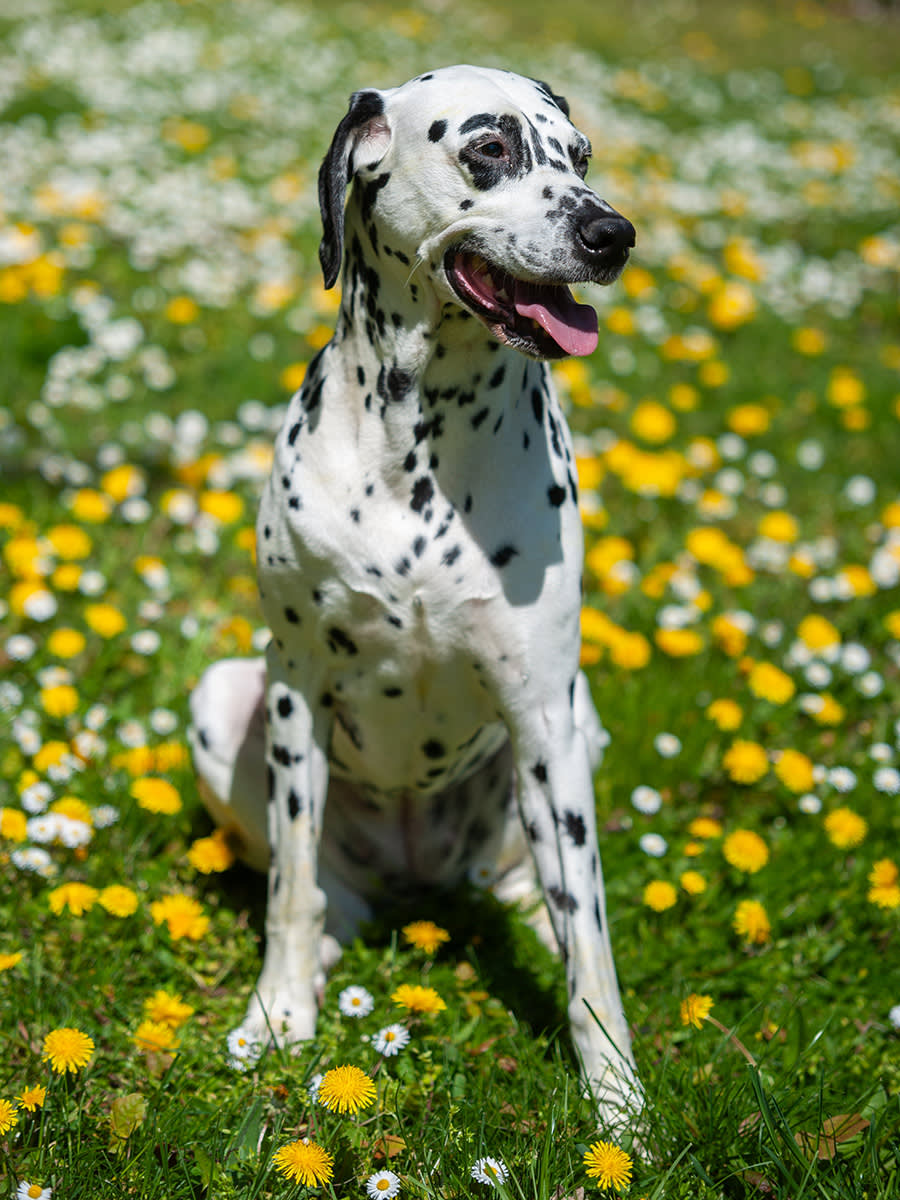
Share Article
In this article:
Are dandelions poisonous to dogs?opens in new tab Dandelion benefitsopens in new tab How many dandelions can dogs eat?opens in new tab Dandelion reactionsopens in new tab FAQsopens in new tab
You’re walking your dog through the park when they suddenly dive nose-first into a patch of bright yellow dandelions, chomping away like they’ve discovered the world’s best salad bar. Before you can even react, half the flower bed has disappeared into their mouth. Sound familiar?
If you’re wondering whether you should be worried about your dog’s impromptu dandelion feast, you’re not alone. These cheerful yellow flowers pop up everywhere – from manicured gardens to wild meadows – making them an almost inevitable encounter for curious dogs who treat the world as their personal buffet.
The good news? Dandelions are generally safe for dogs to munch on. But like most things in life, it’s not quite that simple. Let’s dig into what you actually need to know about dogs and dandelions, because “it’s fine” isn’t really the whole story.
Are dandelions poisonous to dogs?
All parts of the dandelion plant are considered safe, so it doesn’t matter if your pooch eats a leaf, root or flower – good news if your dog loves a grassy snack. As with most things, moderation is key; if they were to eat an exorbitant amount of dandelions, however, then it may cause digestive upset such as vomiting or diarrhoea. We also need to make sure that the dandelions are free from pesticides or fertilisers.
7 benefits of feeding dandelions to your dog
Dandelions have been used for thousands of years by herbalists who have explored their health benefits. Way more research is needed to confirm the benefits to our faithful canines, there is some evidence to suggest they could be nutritious and beneficial.
1. Aids digestion
Dandelion root contains inulin, a type of soluble fibre that acts as a prebiotic. Prebiotics feed the ‘good friendly’ bacteria in the gut, helping improve gut flora balance and overall digestive efficiency.
2. Boosts immune function
Dandelion leaves contain a lot of vitamins and minerals including vitamin A, C, E and K. These can all help to boost the body’s immune system.
3. Supports the liver
Dandelion root is popular in herbal medicine for its effect on helping to support the liveropens in new tab with its detoxification as well as offering general support to the organ.
4. They’re anti-inflammatory
Dandelion contains luteolin and other flavonoids that have demonstrated anti-inflammatory effects. There are even some reports that they could help to fight cancer.
5. Promotes healthy coat
Vitamin A, found in the leaves, is vital for eye health and will also help with problems with poor skin and coat conditions.
6. Natural diuretic
The potassium salts within the leaves can stimulate the kidneys to produce more urine which means excessive fluid and waste can be excreted more effectively. It’s also thought that they may help prevent urinary tract infections and bladder stone formation.
7. Lots of antioxidants
Beta-carotene and polyphenols help reduce free radicals and the effects of oxidative stress.
How many dandelions can dogs eat?
Now that we understand these health benefits, how do we determine whether and how much to give our dogs? If you are considering using dandelion as a herbal supplement then you must talk to your veterinarian about the correct dosage first, and also whether it is safe for them. Care should also be taken if your dog is already on medication as some herbal products can mix with prescribed medicine and cause problems. Dandelion can be found in various forms; fresh leaves (small amounts), dried powder, tea or tincture (dog-safe, alcohol-free).
What to do if your dog has a negative reaction to dandelions
If you are worried that your dog is not feeling good from dandelion ingesting, stop giving it immediately. Provide fresh water, monitor closely and call your veterinary clinic. Ensure you take a sample of the plant or the product packaging with you to any appointment.
Signs your dog ate too many dandelions
Even though it is felt that all parts of the plant are safe if ingested we still should remain vigilant of any side effects if they maybe munch too many. It is a good idea to be mindful of the following:
Digestive upset: vomiting, diarrhoea or lack of appetite.
Allergic reaction: itching, hives, swelling, sneezing or excessive licking of the skin.
Lethargy: sleepiness or behaviour changes that are out of character.
Increased urination or dehydration: strong smelling urine, dry mucous membranes and skin tenting.
Worsening of medical conditions: especially important in dogs with kidney or liver issues.
Bottom line: are dandelions poisonous to dogs?
Dandelion can be a gentle, natural way to support your dog’s immune system through its antioxidant, anti-inflammatory, liver-supportive and prebiotic properties. Like any supplement, it works best as part of a balanced diet and wellness plan tailored to your dog’s individual needs.opens in new tab
Frequently asked questions
What happens if a dog eats dandelions?
The good news is all parts of the plant are edible and have plenty of potential health benefits provided it is not covered in fertiliser or pesticides. It may not be a very appealing snack and so many dogs will probably just ignore them, unlike rabbits and guinea pigs who love to munch on them.
Why is my dog obsessed with dandelions?
Like with anything some dogs fixate on some things, especially if they receive a reaction from us. Always ignore any unwanted behaviour and praise/acknowledge when they come away. Speak to a vet if your dog is showing signs of obsessive chewing behaviour (pica).
What part of the dandelion is poisonous?
All parts of the dandelion plant are non-toxic and safe to eat. However, if any chemicals may have been sprayed to kill them and other weeds it is best to stay safe and keep your dog away.
How many dandelions can my dog eat?
There is no known limit to how much they can eat, and some dogs who are grass eaters may munch through quite a few. Overeating any kind of vegetable or plant can cause a digestive upset.
This information is not meant to be a substitute for veterinary care. Always follow the instructions provided by your vet.
Resources
Cousquer, BVM&S, BSc, CertZooMed, MRCVS, Glen. “ The Noble Dandelion.opens in new tab” VN Times, Sept. 2008, pp. 34–35.
Marchegiani, Andrea, et al. “ Evidences on Molecules Most Frequently Included in Canine and Feline Complementary Feed to Support Liver Function.opens in new tab” Veterinary Medicine International, vol. 2020, May 2020, pp. 1–7.

Zoe Blake RVN, ISFMCertFN / AdvCertFB, MISAP
Zoe is a registered veterinary nurse and has been in the profession for over 30 years. She enjoys educating pet owners on all aspects of their care and regularly writes to support her work. When she is not chatting animals, she can be found running around the tennis court or exploring the countryside with her rescue dog, Dylan.
Related articles
![Kurzhaar's dog eats grass, oats, happy puppy playing in the meadow]()
Why Do Dogs Eat Grass?
When to worry about your pup’s grass consumption (and when it’s not a problem)
![monty don and his golden retriever ned]()
7 Flowers That Are Poisonous to Dogs
Got gardening fever? Avoid these plants
Are Lilies Toxic to My Dog?
This is one of those ‘no, but also yes’ answers...
![a brown and white dog sits in a field of buttercups]()
Are Buttercups Toxic to Dogs?
Lovely flower, not so lovely when eaten by your dog...

